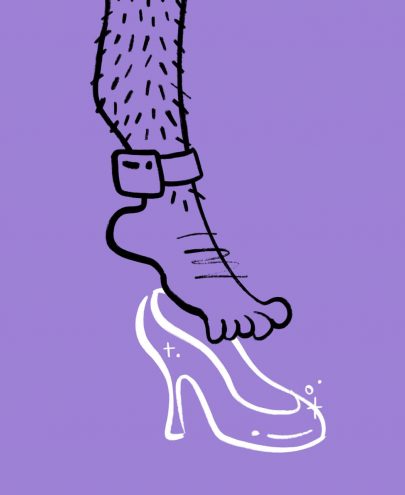Dec 2, 2014 etc
What do you do with your pubic hair?
First published in Metro, January 2013. Illustration by Katy Wakefield.
What is it about pubic hair that makes people bristle? Even academic journals get tongue-tied over the words. Dr Virginia Braun, associate professor at the University of Auckland’s school of psychology, submittted a paper to an American academic journal under the title: It Shouldn’t Stick Out from Your Bikini at the Beach”: Gender, Pubic Hair, and Pubic Hair Removal.
The editors liked it. There was only one only problem: despite the journal specialising in gender and sexuality, they wanted the term “pubic hair” removed. Braun says they thought it would be “too off-putting, or taboo”.
She was shocked. “I’ve been doing research around things related to women’s genitals for 15 years and I’ve never been asked to remove a word from a title,” she says.
If high-minded academics can’t face fuzzy facts, it is hardly surprising the mainstream media gags on the ick factor in pubic-hair discussion. A story I wrote on the same topic for another magazine was spiked at the last minute by an editor terrified that readers would be enraged by news of short and curlies over brunch. “I’d lose my job,” she told me bluntly.
The academic paper was entitled “It Shouldn’t Stick Out from Your Bikini at the Beach”: Gender, Pubic Hair, and Pubic Hair Removal.
Braun researches attitudes to pubic hair, and that censored title captures her conclusion perfectly. Most people, she has learned, consider what they do with their pubic hair entirely their own business until it becomes visible in public. FYI: pubic hair on display at Parnell Baths or Piha this summer is a definite no-no.
Next up, Braun is looking at what people do to their body hair and why. Last March, she and research fellow Dr Gareth Terry conducted an online, anonymous survey of 584 participants between the ages of 18 and 35. They asked about all body-hair practices, not just pubic hair, and looked at potential health issues, the influence of pornography and the time, energy and money people put into eliminating hair.
It is the first study in New Zealand to investigate the topic in depth and initial results give a good indication of what’s going on under Gen Y’s swimming togs.
When it comes to “the shaven haven”, as one survey participant called it, 86 per cent of women and three-quarters of men said they had removed (waxed, shaved or trimmed) pubic hair at some point. A quarter of women surveyed were removing all of their pubic hair at the time of questioning, compared with 10 per cent of males keeping their privates completely smooth.
People in their mid-30s were just as likely to remove pubic hair as respondents in their late teens.
Female leg and underarm hair is a most rare sight indeed. Only three per cent of women did not shave their legs, and the same percentage left their armpits unshorn. It’s much the same overseas: nearly 97 per cent of Australian women shave their underarms and legs, while in the US, 92 per cent remove their leg hair and 93 per cent banish underarm hair.
It’s been over a decade since Sex and the City’s Carrie Bradshaw suffered the ignominy of an overzealous bikini waxer — then decided she rather liked it, catapulting the Brazilian into the mainstream.
“Sex and the City ushered in the idea of complete pubic-hair removal for women with a bang,” says Braun. Since then, stars Gwyneth Paltrow, Victoria Beckham and Eva Longoria have publicly sung the Brazilian’s praises. It’s mainstream.
Paltrow’s pal Cameron Diaz had no qualms about discussing pubic hair on The Graham Norton Show recently. She regaled the audience, and fellow guest Rod Stewart, with a story about a girlfriend who had a “70s bush” so long and thick it floated in the bath “like seaweed”. Diaz and her mates, including the woman’s husband, had seen fit to stage an intervention: they trapped the woman in the shower and attacked her completely natural, healthy pubic zone with a pair of scissors.
“It was literally one of the funniest things ever,” said Diaz, grinning broadly on the talk-show couch.
Braun found that despite the perceived war on pubes, most people aren’t anti-bush — even among those fervent Generation Y waxers. Over three-quarters (76 per cent) felt that pubic hair was acceptable on women’s bodies — although that somewhat shockingly suggests nearly a quarter of the population think ladies should not have pubic hair.
“The overwhelming majority are saying it is desirable for women to have pubic hair.”
And what do we really want? Seventy-one per cent of Braun’s respondents thought it was positively desirable for women to have hair down there. “In contrast to some of the common stories you get out there in the media — that hair-free is most desirable — the overwhelming majority are saying it is desirable for women to have pubic hair,” says Braun.
“It was actually seen as less desirable on men. Only 60 per cent felt it was desirable, but 80 per cent felt it was acceptable.”
You would never know this from looking at the local beauty industry. Many waxing salons refuse treatments to male clients, but not Camilla Amundsen of Metro Waxing. The beauty therapist estimates she has waxed a few thousand men since repositioning her Auckland salon to focus on male waxing treatments four years ago. It was a response to what she saw as a gap in the market. One day a regular client, who usually came for an eyebrow tidy, asked her to remove his pubic hair too.
“Of course,” she replied, then figured out how as she went. Today Amundsen’s most popular male treatments are back, chest and the full Brazilian. The men removing pubic hair are commonly doing it for sexual reasons. “It’s always for their girlfriends or their partners,” says Amundsen. “I do have a large clientele of gay clients, and a lot of husbands too. People are very surprised at that.”
In general, Amundsen’s profession is a barbecue-stopper. “I get the same reaction wherever I go when people find out what I do. People are shocked.”
Karl, 35, a business analyst from Mt Eden who wears slim-cut suits and a chic side-swept do, says waxing is “too scary”. But he has been manscaping with clippers since his early 20s. He thinks a trimmed look is more widely appreciated and “looks better”.
“If you’re dating, the law of averages kicks in and you go, on average, people are not going to be offended if it’s like this,” says Karl.
He denies he is mimicking porn. “It wouldn’t influence me much. In porn, guys are usually completely and utterly shaven or waxed.”
When Karl met his girlfriend Jess, 26, she had what he describes as a “French” look. Since then she has started waxing regularly.
“Not for approval,” she says. “Because I think it would be nicer.”
Seventy per cent of German men remove their underarm hair.
Jess doesn’t enjoy waxing and has had some nasty experiences with ingrown hair — so nasty she needed antibiotic treatment for infection. A friend suggested she try intense pulsed light laser hair removal (IPL) for a more permanent solution. IPL sends a blast of high-intensity light down the hair shaft, where it is converted to heat and damages the hair follicle.
“I suppose I’ll consider that,” she says. “But who knows what the trend will be 10 years from now?”
With that, Jess sums up the crux of the crotch matter. In Braun’s study, the most common reason people gave for removing body hair was the influence of fashion, social norms and expectations. But fashions change. Jess is wary of permanently eradicating pubic hair when, a decade down the line, it might not be the generally accepted thing to do.
The detractors of pubic-hair removal say it is a degrading attempt to copy porn stars and festishises the pre-pubescent body as the sexual ideal. Fans of the practice say it feels more hygienic, increases sensitivity and improves their sex life.
“There was a bit of a story that it was a nice and decent thing to do for your partner, for both men and women,” says Braun. “This idea that getting a mouthful of pubes is unpleasant.”
Braun has not questioned people older than 35 but assumes her results would vary if she did, and vary again if she questioned people in other countries. She was surprised to learn while attending a conference in Germany that 70 per cent of German men removed their underarm hair, about half removed lower leg hair and a high proportion also removed their pubic hair.
Sam is 37. She travels a lot for work, enjoys the single life and had no idea her bikini line was broadcasting her age until a pillow-talk revelation. “A partner of mine, who is the same age as me but who sleeps with a lot of younger women, once said, ‘You can tell the age of a woman by her bikini wax like you can tell the age of a tree by the rings.’ He was like, ‘You’ve got a lot going on down there, whereas a 26-year-old wouldn’t.’”
“You have to do it on Wednesday or Thursday. Then if you don’t get laid, it’s like, ‘What a waste that was.’”
And Sam hasn’t even gone for the “floating seaweed” look. She had her first Brazilian for Valentine’s Day about eight years ago, because her boyfriend found the look erotic. Ever since, she has tended her hair down there to varying degrees, but evidently not to the extent of her younger contemporaries. That’s partly because she can’t be bothered with regular waxes, which require forward planning.
“Because I’m single, I’d be, ‘How likely is it I’m going to have sex this weekend?’ You’d have to do it on Wednesday or Thursday. Then if you don’t get laid, it’s like, ‘What a waste that was.’”
Sam has become aware of an increase in men trimming their pubic hair — which she relates to their level of interest in sex. “For some guys, it’s all a sloppy mess,” she says. “Some guys really think about it in advance and want to be a good lover. Those are the guys who are all about body maintenance.”
Rather than seeing men as under pressure to conform to a new body ideal, Sam appreciates the effort they go to. “I think it’s good. It’s not such a massive imbalance of me trying to remove all my body hair. I don’t feel so grudging and resentful about it now. But also it looks nicer. My ex-boyfriend was right. Being able to see more is kind of a turn-on.”





